What do you think?
Rate this book


496 pages, Hardcover
First published December 2, 2002







“Let one of you touch me and I'll spill his guts on the floor.”That’s my Barbarian Boy! Oh how I love it when my favorite loincloth-wearing Cimmerian of the dangerous (and smoldering!) blue eyes, powerful build, sun-kissed skin and unruly black hair goes all vicious savage on his foes, and threatens to slice them into tiny little pieces! It’s Super Extra Sexy (SES™) and stuff. I mean, how can you NOT swoon when you read stuff life:
“Any man who touches me will quickly be greeting his ancestors in hell.”And like:
“If he had sought to hinder me I'd have split his skull.”


“Civilized men are more discourteous than savages because they know they can be impolite without having their skulls split, as a general thing.”Truer words were never spoken, methinks.


“Free my hands and I'll varnish this floor with your brains!”My Cimmerian Hunney Bunney™ most shamelessly betrayed by a bunch of Super Extra Treacherous Bastards (SETB™)! And made prisoner! And shackled! And locked up in a place that isn’t half as welcoming as my High Security Harem! No wonder he’s ever so slightly pissed off and wants to redecorate his enemy’s interiors with body parts!
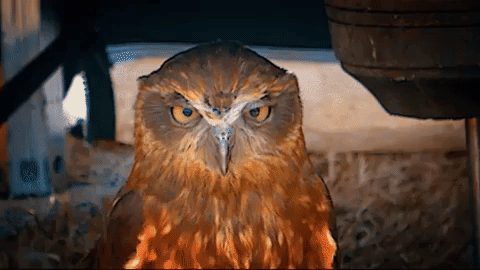
“Slowly a huge, hideous, wedge-shaped head took form before his dilated eyes, and from the darkness oozed, in flowing scaly coils, the ultimate horror of reptilian development […] This reptile was venomous; he saw the great fangs, a foot long, curved like scimitars. From them dripped a colorless liquid that he instinctively knew was death.”Most puny humans in this situation would slightly recoil, and go all, “uh-oh, Houston, we have a problem,” but my Barbarian Poppet ain’t no puny human, obviously, and goes all, “yay, I have a new Extra Chummy Scaly Friend™!” More or less.


“Who is Bêlit?”That she is. And also the original kick-ass chick. Let me tell you, my Comely Decapods, Bêlit here puts 99% of
“The wildest she-devil unhanged.”

"Look at me, Conan!" She threw wide her arms. "I am Bêlit, queen of the black coast. Oh, tiger of the North, you are cold as the snowy mountains which bred you. Take me and crush me with your fierce love! Go with me to the ends of the earth and the ends of the sea! I am a queen by fire and steel and slaughter – be thou my king!"These two were meant to be together, if you ask me. And, believe it or not, I’m not jealous of their little fling. Not even a little. Why would I be, anyway? He’s my boyfriend, she’s my girlfriend, one big happy family and stuff!
“1. — CONAN JOINS THE PIRATES”And this is when I went all,

“So then, seeing they were all mad, I drew my sword and cleft the judge's skull”Such a quick thinking babe you are, Appetizing Barbarian Mine! Talking about being quick, a good thing you made a hasty escape here, and found a ship to flee this most welcoming city post haste!
"Can you pay for your passage?" demanded the master.Always so generous with his funds, my boyfriend. It’s beautiful, really. Anyway, Conan got aboard the ship, stuff happened again, he met my girlfriend Bêlit and her pirate crew, and 💕insta-lurve💕 was instantly in the air.
"I pay my way with steel!" roared the man in armor, brandishing the great sword that glittered bluely in the sun. "By Crom, man, if you don't get under way, I'll drench this galley in the blood of its crew!"
“He glanced at the blue-fringed shore, at the far green hazes of the ocean, at the vibrant figure which stood before him; and his barbaric soul stirred within him. To quest these shining blue realms with that white-skinned young tiger-cat—to love, laugh, wander and pillage—"I'll sail with you," he grunted, shaking the red drops from his blade.”Note to self: never forget to shake the blood from your blade, it’s hot as fish.









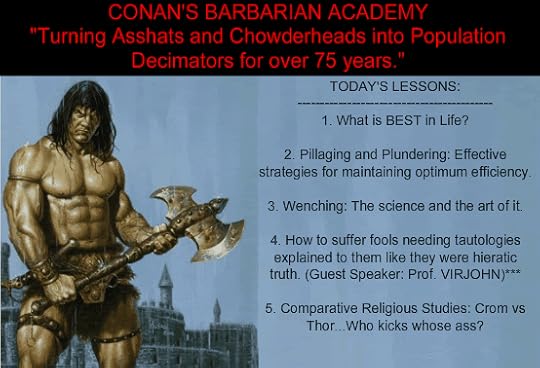
"Hither came Conan, the Cimmerian, black-haired, sullen-eyed, sword in hand, a thief, a reaver, a slayer, with gigantic melancholies and gigantic mirth, to tread the jeweled thrones of the Earth under his sandaled feet."Taking place at a time when Conan was King of Aquilonia, plot concerns a group of four conspirators plotting to assassinate Conan and take the crown. Notable as the first appearance of the dark wizard Thoth-Amon. 5.0 STARS
The clangor of the swords had died away, the shouting of the slaughter was hushed; silence lay on the red-stained snow. The bleak pale sun that glittered so blindingly from the ice-fields and the snow-covered plains struck sheens of silver from rent corselet and broken blade, where the dead lay as they had fallen. The nerveless hand yet gripped the broken hilt; helmeted heads back-drawn in the death-throes, tilted red beards and golden beards grimly upward, as if in last invocation to Ymir the frost-giant, god of a warrior-race.Conan meets a mysterious woman who takes him to the far North into the legendary realm of the Frost Giants. 4.5 to 5.0 STARS.
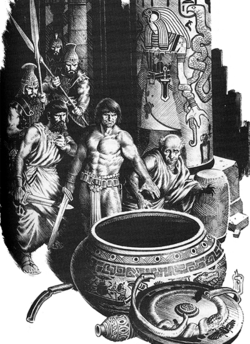
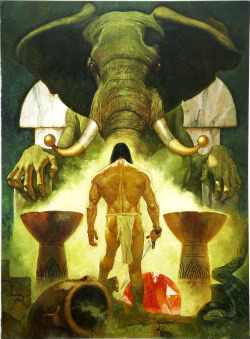
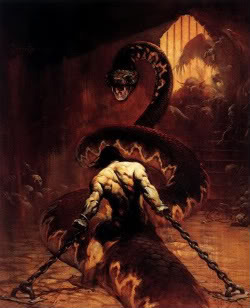
You sit on satin and guzzle wine that the people sweat for, and talk of divine rights of sovereignty — BAH! I climbed out of the abyss of naked barbarism to the throne and in that climb I spilt my blood as freely as I spilt that of others. If either of us has the right to rule men, by Crom, it is I.
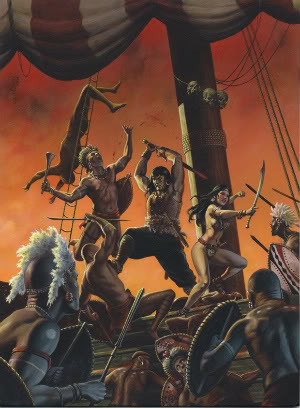
Conan glared frozen with repulsion and shaken with nausea. Himself as cleanly elemental as a timber wolf, he was yet not ignorant of the perverse secrets of rotting civilizations. He had roamed the cities of Zamora, and known the women of Shadizar the Wicked. But he sensed here a cosmic vileness transcending mere human degeneracy--a perverse branch on the tree of Life, developed along lines outside human comprehension.Yeah….those kind of nasties. 5.0 to 5.5 STARS.

In this world men struggle and suffer vainly, finding pleasure only in the bright madness of battle; dying, their souls enter a gray misty realm of clouds and icy winds, to wander cheerlessly throughout eternity. (...) I know this: if life is illusion, then I am no less an illusion, and being thus, the illusion is real to me. I live, I burn with life, I love, I slay, and am content.
Dans ce monde, les hommes se battent et souffrent en vain, ne trouvant du plaisir que dans la folle ardeur de la bataille, et lorsqu'ils meurent, leurs âmes pénètrent dans une contrée grise et brumeuse, balayée par les nuages et des vents glacés, où elles erreront sans joie pour l'éternité. (...) Je laisse les professeurs, les prêtres et les philosophes méditer sur la question de la réalité et de l'illusion. Je sais ceci : si la vie est une illusion, alors je suis moi aussi une illusion, et par conséquent, l'illusion est réelle pour moi. Je vis, je brûle de l'ardeur de vivre, j'aime, je tue, et je suis satisfait.
Hither came Conan, the Cimmerian, black-haired, sullen-eyed, sword in hand, a thief, a reaver, a slayer, with gigantic melancholies and gigantic mirth, to tread the jeweled thrones of the Earth under his sandalled feet.
…the allied army moved forward like a shimmering ocean of steel.
The whole plain shook to the rumbling avalanche of hoofs, and the shimmer of gold and steel dazzled the watchers on the towers of Shamar.
Rising above the black denseness of the trees and above the waving fronds, the moon silvered the river, and their wake became a rippling scintillation of phosphorescent bubbles that widened like a shining road of bursting jewels.
